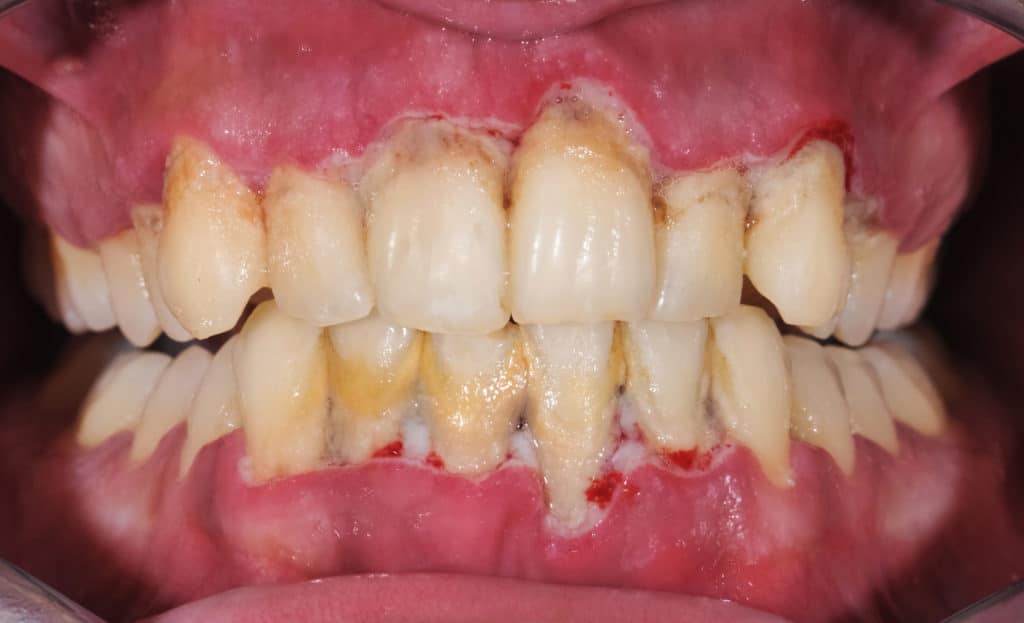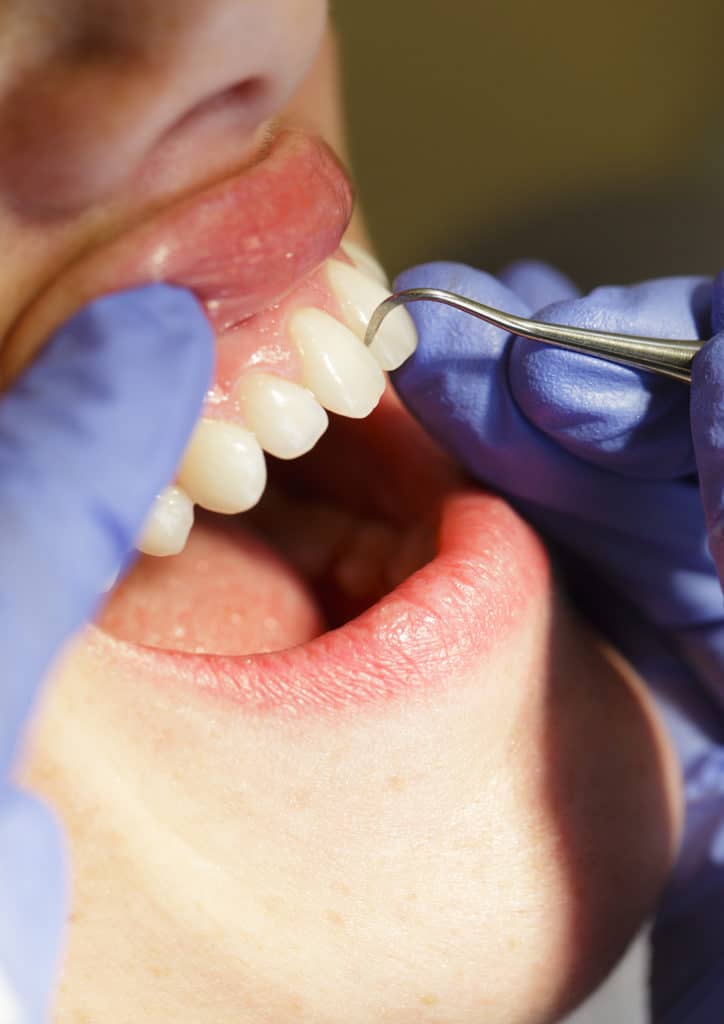What Are Periodontal Diseases?
In general, periodontal diseases or gum diseases are a result of prolific bacterial growth in the mouth and is one of the leading causes of tooth loss because of the consequent destruction of the tissues that support and hold the teeth. A significant number of patients acquired some disease at some point in their lives, and one of the earliest symptoms of periodontal distress is gingivitis or gum inflation, which normally precedes gum disease and gradually progresses to inflation.
As the bacteria in plaque build up, the gums become infected and inflamed and this may lead to bleeding when the patient brushes his teeth. At this stage, the teeth will still be firmly planted in the gum tissue, although, if left untreated, the inner layers of the gums and parts of the underlying bone may begin to pull away from the teeth and form pockets that become the breeding place of the infection.
As periodontal disease progresses, more gum tissue is destroyed and it will no longer be able to hold the teeth in place, resulting in tooth loss.
What Causes Periodontal Disease?
The primary cause of the periodontal disease is the buildup of plaque, however, other factors such as hormonal changes in pregnancy, puberty, or menopause; underlying health conditions like diabetes, cancer, HIV, or other immune deficiencies; oral medications including anticonvulsants and anti-angina drugs; bad lifestyle habits like smoking; poor oral hygiene; or a documented family history of dental disease could all contribute to the development of the disease.

What Are The Symptoms of Periodontal Disease?
Symptoms of periodontal disease include bleeding gums, persistent bad breath, a bad taste in the mouth, swollen or tender gums, receding gum line, or teeth that begin to come loose or start to shift.
What People Say About Us!
Gental Dental has great dentist and dental staff. They are very friendly and helpful . They make you feel comfortable and understand your concerns. The staff will work with you no matter your financial situation might be. I highly recommend this dental office.
Click here to read more reviews.
The Stages Of Periodontal Disease
Periodontal disease is a progression. It’s not as if you awaken one day and have a period-endo lesion. Gum disease shows its hand all along the path from gum irritation up to tooth loss. You can break gum disease into different types or stages depending on how it has progressed.
- Gingivitis — This is an early gum disease. Basically, it simply means that plaque is beginning to irritate the gums, making them red and prone to bleeding.
- Chronic periodontitis — Gums have pulled away from the teeth and formed pockets where bacteria are accumulating. Periodontitis always starts with gingivitis. Now the bacteria will begin attacking the bone and tissues attaching the teeth to the jawbone.
- Periodontal abscess — This happens when a pocket forms and becomes infected to the degree that an abscess forms. This will lead to the quick destruction of the attaching tissues of the teeth in the area.
- Perio-endo lesion — This occurs when the infection begins in the tooth root. When decay enters a tooth, if not removed, it can eventually impact the pulp and the nerves and blood vessels within the pulp. This infection moves from the tooth into the surrounding gums.
- Gingival recession — This isn’t always due to plaque buildup. Overly aggressive tooth brushing can also cause this recession. The gums recede, exposing the tooth root that is normally covered by the gums.
- Am I at risk for developing periodontal disease?
People are not predisposed to develop periodontal disease. In almost all cases, it simply is due to poor oral hygiene at home, coupled with the lack of twice-yearly professional cleanings and exams with the team at Gentle Dental. Smoking and chewing tobacco can increase your chances. Some medications have a side effect that causes dry mouth, which limits saliva production and can make it harder to keep your gums clean. Hormonal changes during pregnancy and menopause can make your gums more sensitive.
Generally, though, this is one disease that is mostly self-inflicted.

How To Prevent Periodontal Disease
Periodontal diseases can be successfully prevented if the patient practices proper plaque control. This method involves going into the dentist’s office for a professional cleaning appointment at least twice a year, supplemented by regular brushing to remove plaque from the accessible surfaces of the teeth, and flossing to eliminate food that has become stuck in between the teeth or under the gum line.
Is Gum Disease Reversible?
Gum disease can almost always be reversed. It’s a matter of reducing the pockets, removing the infection, restoring the bone (if necessary), and getting the gums to reattach to the teeth. Of course, how far the gum disease has progressed can dictate if the reversal is possible. For instance, if a person has allowed the disease to progress to the point where all of his or her teeth are affected and cannot be saved, extraction may be necessary, and the teeth replaced by dentures or dental implants.
How To Treat Gum Disease
Treatment options for the management of gum disease depend on what stage the disease is in, the patient’s overall oral health, and response to previous treatment.
Nonsurgical treatment options include professional dental cleaning or scaling and root planing, which is a deep cleaning procedure. Both methods remove plaque and tartar buildup from above and below the gum line.
Surgical treatments for periodontal diseases include flap surgery, bone graft grafting, soft tissue grafting, guided tissue regeneration, and bone surgery. Surgical options are usually used when the gum tissue surrounding the teeth becomes unhealthy and the disease cannot be corrected using nonsurgical options.

What Kind Of Post-Treatment Care Is Necessary?
That depends on the procedures we had to perform. For instance, if we performed root scaling and planing, this is a relatively simple procedure where we remove tartar and plaque from under your gum line and then smooth the surface to help the gums attach back to the root surface. This doesn’t require any post-treatment care, other than better home hygiene moving forward. Other more involved procedures, such as soft tissue grafting or flap surgery, involve more attentive care during recovery to be sure to keep the infection from rebuilding.
We’ll explain what you need to do in detail after our periodontal disease treatments, as your involvement will be necessary if your mouth is to return to good health again.
Is The Treatment Of Gum Disease Permanent?
Yes, these treatments performed by our Gentle Dental team to stem and reverse your periodontal disease are permanent treatments, meaning your results will last and your gum disease will be gone.
But this depends on you. Remember, it’s poor home hygiene and a lack of professional cleanings and exams that allowed the gum disease to develop in the first place. It’s going to take a new dedication to excellent home hygiene moving forward. Otherwise, gum disease can return.
What Happens If I Don’t Have My Gum Disease Treated?
It’s a shame that we see patients who have let gum disease start. It’s even more of a shame when they let it keep getting worse. Gum disease is a progression. It starts with plaque buildup. That buildup of bacteria and the acids they produce begins to irritate the gums — gingivitis.
As plaque builds, it begins to calcify and turn into tartar. Without professional cleaning, tartar continues to build, and it begins to move under the gumline. Now you’re moving into full gum disease.
Tartar will make the gums begin to pull away from the teeth, forming pockets. These pockets are perfect breeding grounds for bacteria. Now the bacteria begin to attack your gums, the tissues connecting your teeth to your jawbone, and the tooth roots. You can see where this is headed. Your teeth begin to loosen and become decayed. They will begin to fall out or need extraction.
What’s the bottom line of leaving gum disease to its own devices? Dentures. Jawbone deterioration. Possible further health complications such as heart disease. You don’t want any of that.
Patient Testimonial
What are Scaling and Root Planing?
Scaling and root planing are the next steps up from your standard dental cleaning. It's a necessary treatment in which ultrasonic devices or handheld instruments are used to remove stuck-on plaque and tartar from teeth and root surfaces. The nonsurgical treatment is performed using a local anesthetic, so you remain awake and comfortable while your doctor carefully addresses debris above and below your gum line. This is the scaling aspect of deep cleaning.
The root planing part of this service focuses on smoothing out the rough surfaces of your teeth roots. When you have gum recession, there are pockets of bacteria around some teeth roots. The acid from the bacteria degrades the structure of your roots, making them wavy, indented, and rough. These characteristics make it more difficult for the gum tissue to reattach well enough to prevent further breakdown. Planing, or smoothing, the roots, the stage can be set for a healthy recovery from gum disease.
Scaling and root planing are only performed on one area of the mouth at a time. If you have periodontal pockets in more than one of the four quadrants of your mouth, you may be scheduled to have your deep cleaning performed in stages.
Is Scaling and Root Planing Effective?
Scaling and root planing are the gold standard of non-surgical gum disease treatments. Keep in mind that it cannot reverse severe periodontal disease. However, if your gum infection is limited to the gingiva and the roots of some teeth, yet your jawbone and periodontal ligament remain in good condition, this service can significantly improve your oral health. The long-term results of scaling and root planing will be better if you don't smoke and do not have diabetes. That said, you can sustain relatively good oral health after this treatment if you take impeccable care of your teeth and take measures to manage your lifestyle and general health.
What Surgical Treatments are Used to Treat Gum Disease?
If your gum disease has severely damaged your periodontal tissue or jawbone, there is a risk that you could lose one or more teeth in the affected area. Several surgical procedures may be considered as we seek to preserve your teeth and prevent further damage. These include:
- Flap surgery. This is done to reduce periodontal pockets. To do this, the doctor makes tiny cuts in the gums before performing scaling and root planing.
- Soft tissue grafting. Done to correct gum recession, soft tissue grafting attaches tissue taken from the roof of your mouth to the damaged area.
- Bone grafting. Performed to build up the bone tissue where severe damage has occurred, this procedure places bone taken from another part of your body into the jaw, where it will integrate over the course of a few months.
- Tissue regeneration treatment. The placement of biocompatible material may be done to close gaps between teeth and bone. This helps promote the growth of new bone cells.
- Tissue-stimulating proteins may be applied to an area of infection around the root of a tooth to help regrow healthy tissue.
Schedule Your Consultation
If you are suffering from periodontal disease in Edison, Piscataway Township, New Brunswick, Metuchen, or Woodbridge Township, NJ, visit our office or fill out our contact form.



